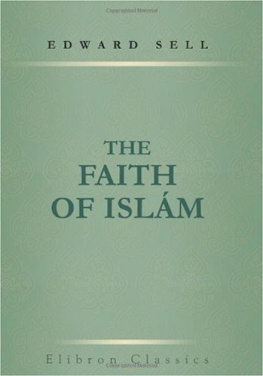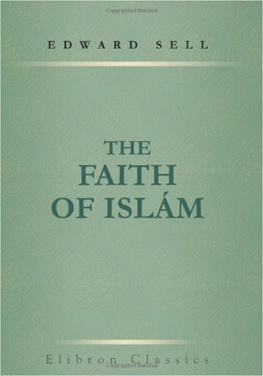The Project Gutenberg EBook of The Faith of Islam, by Edward Sell
This eBook is for the use of anyone anywhere at no cost and with
almost no restrictions whatsoever. You may copy it, give it away or
re-use it under the terms of the Project Gutenberg License included
with this eBook or online at www.gutenberg.org
Title: The Faith of Islam
Author: Edward Sell
Release Date: February 24, 2007 [EBook #20660]
Language: English
*** START OF THIS PROJECT GUTENBERG EBOOK THE FAITH OF ISLAM ***
Produced by Michael Ciesielski, Keith Edkins and the Online
Distributed Proofreading Team at http://www.pgdp.net (This
file was produced from images generously made available
by The Internet Archive)
| Transcriber's note: | A few typographical errors have been corrected. They appear in the text like this , and the explanation will appear when the mouse pointer is moved over the marked passage. |
THE
FAITH OF ISLAM:
BY
THE Rev. EDWARD SELL,
FELLOW OF THE UNIVERSITY OF MADRAS.
TRBNER & CO., LONDON.
ADDISON & CO., MADRAS.
1880.
All rights reserved.
MADRAS:
PRINTED BY ADDISON AND CO., MOUNT ROAD.
PREFACE.
The following pages embody a study of Islm during a residence of fifteen years in India, the greater part of which time I have been in daily intercourse with Musalmns. I have given in the footnotes the authorities from which I quote. I was not able to procure in Madras a copy of the Arabic edition of Ibn Khaldoun's great work, but the French translation by Baron M. de Slane, to which I so frequently refer, is thoroughly reliable. The quotations from the Qurn are made from Rodwell's translation. The original has been consulted when necessary.
A few slight and occasional errors in transliteration have occurred, such as Sult for Salt, Munkar for Munkir, &c., but in no case is the meaning affected.
In some words, such as Khalf, Khalfate, and Omar, I have retained the anglicised form instead of using the more correct terms, Khalfa, Khilfat, 'Umr. The letter Q has been used to distinguish the Kf-i-Karashat from the Kf-i-Tz.
E. S.
Madras,
December 1st, 1880.
CONTENTS.
Introduction.... PAGE ix
CHAPTER I.
THE FOUNDATIONS OF ISLM.
The QurnIts revelationMiraculous natureArrangement of QurnOsmn's recension. The SunnatThe authority of SunnatTraditionBid'at or innovationSha'h Traditions. Ijm'IjtihdFour orthodox Imms, Hanfa, Mlik, Shfa' and Hanbal. QsEstablished by the early MujtahidnSterility of Islm ... PAGE
Note to Chapter I. Ijtihd ... PAGE
CHAPTER II.
EXEGESIS OF THE QURN AND THE TRADITIONS.
InspirationThe seven readingsWork of a CommentatorWords and Sentences of the QurnUse of the wordsDeductions of arguments from the QurnDivisions of the QurnAbrogationCreation of the QurnHads or TraditionCollections of TraditionsClassification of Traditions ... PAGE
CHAPTER III.
THE SECTS OF ISLM.
The Sha'hsThe ImmatKhrigitesNr-i-MuhammadImmIsm,lians and ImmitesGhair-i-MahdsD,irMahmdahKhalfateSfismPersian PoetryDarwshesOmar KhayymWahhbstheir risespread in Indiadoctrines and influence ... PAGE
Note to Chapter III. Wahhbism ... PAGE
CHAPTER IV.
THE CREED OF ISLM
ImnGodAttributes of GodDiscussions on the nature of GodThe rise of the MutazilitesThe SiftansMushbihitesNames of GodCreation of the Qurn. AngelsRecording AngelsHrt and MrtMunkir and NakrJinn. The BooksAbrogationTahrf. The ProphetsRank and inspiration of prophetsNab and RaslSinlessness of prophetsThe Anbiya-ulul-'AzmMiracles of prophetsThe Mi'rj. The Resurrection and the last dayThe TrumpetsDescent of the booksBalancesBridgeAl-A'rfAl-BarzakhIntercession of MuhammadHeavenHell. The Predestination of good and evilJabransQadransAsh'aransFree-willApostacy ... PAGE
Note to Chapter IV. Muslim Philosophy ... PAGE
CHAPTER V.
THE PRACTICAL DUTIES OF ISLM.
Farz, wjib, sunnat, mustahab and mubh actionsHarm or unlawful acts. Tashahhud. SaltWazGhuslTayammumNamzFarz, sunnat, witr and nafl rak'atsAppointed hours of prayerFriday Namz and sermonNamz on a journey and in time of warNamz in Ramazn, during an eclipse and in time of droughtFuneral serviceIts ritual and prayers. FastingIts time and nature. ZaktNisbProportion of property to be given as almsRecipients of the Zakt. The HajjFarz, sunnat, wjib and mustahab duties connected with the HajjTime for the HajjArrival of the Hj at MeccaTawfCeremonies of the HajjConclusion of the HajjFormal nature of Islm ... PAGE
Note to Chapter V. Fatv on the Namz ... PAGE
CHAPTER VI.
THE FEASTS AND FASTS OF ISLM.
Muharram'shr KhnaMarsiyaWqi'a Khn'AlamsCeremonies of the 'shrFtihas for 'Al, for Hasan and HusainAkhir-i-chr ShambaBr WaftJashn-i-mild-i-Sharifsr-i-SharfShab BartRamazn and 'd-ul-Fitr'ItikfSadqaSermon on the 'd-ul-FitrBaqr-'d or 'd-uz-ZuhSermon on the 'd-uz-ZuhThe Qurbn or SacrificeFestival of MadrFestival of Slr Mas'd GhzFestival of Khja KhizrFeast of Pr Dastgr ShibFestival of Qdir Wal Shib ... PAGE
Index of Technical Terms ... PAGE
INTRODUCTION.
It is necessary to enter into some explanation as regards the contents of this work. It does not fall in with its plan to enter into an account either of the life of Muhammad or of the wide and rapid spread of the system founded by him. The first has been done by able writers in England, France and Germany. I could add nothing new to this portion of the subject, nor throw new light upon it. The political growth of Muslim nations has also been set forth in various ways.
It seems to me that the more important study at this time is that of the religious system which has grown out of the Prophet's teaching, and of its effect upon the individual and the community. What the Church in her missionary enterprise has to deal with, what European Governments in the political world have to do with is Islm as it is, and as it now influences those who rule and those who are ruled under it.
I have, therefore, tried to show from authentic sources, and from a practical knowledge of it, what the Faith of Islm really is, and how it influences men and nations in the present day. I think that recent Fatvs delivered by the 'Ulam in Constantinople show how firmly a Muslim State is bound in the fetters of an unchangeable Law, whilst the present practice of orthodox Muslims all the world over is a constant carrying out of the precepts given in the Qurn and the Sunnat, and an illustration of the principles I have shown to belong to Islm. On this subject it is not too much to say that there is, except amongst Oriental scholars, much misconception.
Again, much that is written on Islm is written either in ignorant prejudice, or from an ideal standpoint. To understand it aright, one should know its literature and live amongst its people. I have tried faithfully to prove every statement I have made; and if, now and again, I have quoted European authors, it is only by way of illustration. I rest my case entirely upon Musalmn authorities themselves. Still more, I have ascertained from living witnesses that the principles I have tried to show as existing in Islm, are really at work now and are as potent as at any previous period.
I have thus traced up from the very foundations the rise and development of the system, seeking wherever possible to link the past with the present. In order not to interfere with this unity of plan, I have had to leave many subjects untouched, such as those connected with the civil law, with slavery, divorce, jihd or religious wars, &c. A good digest of Muhammadan Law[1] will give all necessary information on these points. The basis of the Law which determines these questions is what I have described in my first chapter. Ijtihd, for example, rules quite as effectually in a question of domestic economy or political jurisprudence as on points of dogma. It was not, therefore, necessary for me to go into details on these points.








![G. Wyman (george Wyman) Bury - Pan-Islam [Microform]](/uploads/posts/book/60938/thumbs/g-wyman-george-wyman-bury-pan-islam-microform.jpg)
